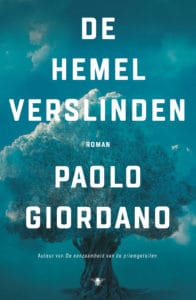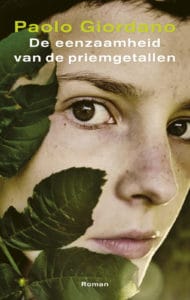Bestsellerauteur Paolo Giordano (35) schuwt in zijn nieuwe roman De hemel verslinden de actuele thema’s niet. Armoede, milieuproblemen, kapitalisme, (on)vruchtbaarheid – twintigers en dertigers hebben veel om hun hoofd over te breken. ‘Het vastomlijnde levensstramien waarmee we opgroeien vind ik verwurgend.’
De hemel verslinden
Jonge mensen die hun weg moeten vinden in de wereld en moeten leren omgaan met pijn, verlies en verantwoordelijkheid – de Italiaanse schrijver Paolo Giordano wijdde daar al eerdere romans aan, zoals zijn De eenzaamheid van priemgetallen en Het menselijk lichaam. Zijn nieuwe boek De hemel verslinden volgt vier jongeren, wier levens met elkaar vervlochten raken. De Turijnse Teresa brengt haar zomers door bij haar oma in het zuidelijke Puglia. Ze leert de drie jongens van de nabij gelegen boerderij kennen, Nicola, Bern en Tommaso, die een heel andere en veel religieuzere opvoeding krijgen dan zij. Terwijl ze volwassen worden en zich ieder voor zich afvragen hoe ze hun eigen leven willen vormgeven binnen onze kapitalistische wereld, welke waarden ze belangrijk vinden, lopen de onderlinge vriendschappen averij op door verschillen in levensvisie, jaloezie en ingrijpende gebeurtenissen.
Crisis
In een eerder interview zei je dat je voor elke roman een crisis nodig hebt. Wat voor crisis lag aan dit boek ten grondslag?
Giordano lacht. ‘In dit geval waren het er eigenlijk twee,’ bekent hij. ‘Het boek begint met een scène waarin Teresa ziet hoe de drie jongens zich uitkleden om stiekem in het zwembad bij haar huis te gaan zwemmen. Je kunt het uitkleden zien als een metafoor voor het afleggen van de laagjes om je heen. Ik miste het gevoel dat we allemaal wel kennen van toen we klein waren: dat je volkomen onbevangen en zonder enige terughoudendheid helemaal kon verliezen in een verhaal. Het vermogen om de wereld zo zonder voorbehoud tegemoet te treden, ben ik denk op een of andere manier ben verloren toen ik een jaar of 12, 13 was. En sinds ik natuurkundige en schrijver ben geworden, ben ik helemaal een stuk bedachtzamer en analytischer. Ik besefte dat als ik weer zo onbevangen wilde kunnen lezen, schrijven, léven, ik alles wat ik wist en had geleerd, en de bescherming die ik gaandeweg mijn leven had opgebouwd, moest proberen los te laten. Dat voelde als uitkleden, naakt worden. Uiteindelijk mondde dat uit in een verhaal over jonge mensen die de wereld voor het eerst ontdekken.’
Wat was dan de tweede?
‘Het klinkt raar om het zo hardop te zeggen, maar dat was een spirituele, of beter gezegd, een religieuze crisis – vandaar dat het geloof een belangrijke rol speelt in dit boek. Welke rol het geloof speelt in mijn eigen leven, was een vraag die ik jarenlang had weggestopt. Nu diende die vraag zich weer aan, ik begon er weer over na te denken. Ik kwam tot het besef dat ik geloof en religie gewoon simpelweg uit mijn leven had gebannen, want dat is in onze huidige tijd heel eenvoudig, ook in het van oudsher katholieke Italië. De jongere generaties in ons land verschillen daarin weinig van andere Europeanen. Dat maakte het vraagstuk alleen maar urgenter. Want het geloof, de waarden die ermee samenhangen, is niet iets wat je zo maar even wegwerpt. Ik begon erover te lezen, bezocht ik een paar Bijbelstudies. Vanuit een diepe interesse, maar ook vanuit een heel theoretische grondhouding, als die van een atheïst. Maar wel vanuit de vraag: waar sta ik, te midden van dit alles?’
Zingeving
Veel jongere mensen keren zich voor zingeving richting mindfulness, yoga of andere spirituele bewegingen.
‘Klopt, maar Ik denk niet dat er echt substituut is voor ons verlangen naar God. Mijn personage Bern, die geboren en getogen is met het geloof, zoekt het later ook in andere dingen, maar niets kan zijn diepere verlangen daadwerkelijk bevredigen. Ik ben zelf areligieus opgevoed. Terwijl Bern op een bepaald moment het geloof afwijst en zijn eigen weg zoekt, deed ik als tiener het tegenovergestelde: ik liet me dopen. Al was dat ook uit rebellie tegen mijn atheïstische vader. Later, toen ik natuurkunde ging studeren, kwam religie weer verder van me af te staan. Die wetenschappelijke wereld is erg anti-religieus, al ben ik zelf van mening dat het één het ander helemaal niet uitsluit.
Na tien jaar kwam ik tot het besef dat er iets niet klopte aan de manier waarop ik in het leven stond. Ik voelde dat er iets ontbrak. Mijn geloof is heel rudimentair, ik twijfel veel, te veel. Over alles. Maar schrijven is wat voor mij het dichtst in de buurt komt van bidden. Het gevoel van verbondenheid dat anderen vinden in gebed, ervaar ik tijdens het schrijven. Dit boek is in zekere zin het antwoord op mijn vraag hoe ik me verhoud tot het geloof. Maar ik schreef het ook omdat naar mijn idee dat er een sterke relatie is tussen de wereld van vandaag en religie. Tussen het feit dat we het geloof hebben afgezworen, terwijl het aan de andere kant terugkomt op zeer ongecontroleerde manieren.’
Via terrorisme en zelfmoordaanslagen, bedoel je?
‘Precies. Het is alsof er overal geisers in de grond zitten, die onverwacht en met veel geweld tot uitbarsting komen. Je kunt zeggen: die mensen zijn gek. Maar we moeten ons realiseren dat zulke gebeurtenissen een relatie hebben met onszelf, ze zijn een reactie, een zoektocht, een verkeerd antwoord op iets waar we allemaal mee te maken hebben. Ik denk dat literatuur en kunst die spiegel zouden moeten voorhouden en ons tot reflectie moeten aanzetten.’
Ecologie en economie
Op wat voor manier weerspiegelt jouw roman de problemen van de huidige tijd?
‘Dat betreft niet alleen geloof, maar ook onderwerpen als ecologie en het zoeken naar een andere manier van leven dan de conventionele kapitalistische manier waaraan we allemaal zijn onderworpen. In Puglia – maar niet alleen daar – zijn de milieuproblemen groot, en dat leidt tot gevechten. De scène waarin honderden olijfbomen worden gekapt om vervangen te worden door genetisch gemodificeerde olijfbomen, is iets wat daar op dit moment speelt. Maar zo zijn er meer voorbeelden, van Frankrijk, Spanje of Duitsland tot India. Het is een wereldwijd gegeven. Maar in Italië is de situatie wel extra complex, omdat er gigantische verschillen bestaan tussen het noorden en het zuiden. Als je van Turijn naar Puglia reist, kom je in een andere wereld terecht. In het zuiden is het leven sociaal en economisch veel moeilijker. Er zijn daar hele dorpen waar geen jonge mensen meer wonen; die hebben allemaal moeten verhuizen omdat ze er geen bestaan konden opbouwen.’
Mooiste plek van de wereld
Je schrijft met liefde over Puglia. Wat is voor jou de aantrekkingskracht van die streek?
‘Het is er zo mooi – een van de mooiste gebieden van de wereld, vind ik. Toen ik er voor het eerst kwam, zo’n twintig jaar geleden, werd ik verliefd op de streek, de olijfbomen, de rode aarde, het licht, dat je nergens zo ziet als daar. Er wordt daar iets in mij aangeraakt dat in het noorden niet tot uiting komt, zoals het zuidelijke, zonnige gevoel en de verbinding met de natuur. De zomers zijn er heet, je loopt er half in je blootje. Als ik daar een tijdje ben, voel ik me echt heel anders: meer in mijn lijf, gezonder, energieker. Meer in mijn lichaam aanwezig zijn, is de grootste uitdaging van mijn leven, als natuurkundige en als schrijver – twee beroepen waardoor ik erg in mijn hoofd zit. Het is een uitdaging om hier en nu aanwezig te zijn. Daarom heb ik in Puglia een groententuin. Ik ben niet goed in tuinieren, maar ik probeer het. Het gaat niet echt om de groenten, ik doe het vooral omdat het goed voor me is.’
Gezinsvorming
Net als jouw collega en landgenote Silvia Avallone schrijf je over hoe moeizaam het is voor jonge mensen om kinderen te krijgen.
‘Dat was zelfs een van de uitgangspunten voor het boek. In onze leeftijdsfase is het overal om ons heen – vrienden krijgen hun eerste of tweede kind, hebben we moeite om zwanger te raken of ze besluiten juist om maar geen kinderen te krijgen. Voor veel mensen is het een veel grotere worsteling dan ik had gedacht. Het weerspiegelt in sterke mate de sociale en economische context van de wereld waarin we leven. We groeien allemaal op met een heel vastomlijnd idee: eerst moeten we studeren, daarna krijgen we een baan, dan moet je genoeg verdienen om een stabiel leven te kunnen leiden, een huis te kunnen betalen, en een auto. Helemaal aan het einde van de rit beginnen we na te denken over een gezin. En tegen die tijd moet dat ook wel, want dan is er eigenlijk niet zo veel tijd meer. Dat vind ik verwurgend. Het leven zou gewoon moeten inbreken, zodat er nog iets spontaans zou zijn aan het krijgen van kinderen. Maar jonge generaties kunnen er niet meer op die manier over nadenken, en ik denk dat mede om die reden steeds meer jonge mensen er maar helemaal van afzien: omdat kinderen krijgen het zoveelste wordt op het to-dolijstje.
Zo vergaat het mijn personages ook in zekere zin: op een gegeven moment besluiten ze dat er een kind moet komen. Maar de natuur blijkt niet genereus. Hoe ga je dan om met zo’n tegenslag? En met wat er inmiddels allemaal kan op het vlak van voortplanting? Er zit een heel eng kantje aan de medische en technologische vooruitgang, tegelijk gaat er ook veel lijden gepaard met onvruchtbaarheid. Over al die onderwerpen wordt niet openlijk gesproken. Maar stilzwijgen leidt juist tot excessen.’
Kunnen romans helpen dit taboe te doorbreken?
‘Ik denk van wel, omdat ze een onderwerp aan de orde stellen dat niet op televisie of in de kranten behandeld wordt. Vanuit menselijke optiek, niet vanuit veroordeling. We worden omgeven door oordelen, maar het is juist de taak van de literatuur om de menselijke kant van zulke kwesties te belichten. Individuele lezers die ermee te maken hebben zullen zich er hopelijk door gesteund voelen. Als een roman hun gevoel van schaamte en eenzaamheid enigszins kan verlichten, dan is dat het grootste succes.’
Je bent 35, je vrouw heeft twee kinderen uit een eerder huwelijk. Denk je erover zelf ook nog een kind te krijgen?
‘Ik denk er niet echt over na. Ik heb besloten er niet over na te denken. Op het pad studie-werk-huis-kind heb ik bepaalde fasen overgeslagen, want ik moest die lijn doorbreken. Mijn vrouw had twee kinderen, en dat betekende een grote verantwoordelijkheid. In datzelfde jaar verscheen mijn debuutroman, en dat zette alles op z’n kop. Op een of andere manier probeer ik steeds op een andere plek te zijn dan waar het gewone leven me verwacht.’
De hemel verslinden is verschenen bij De Bezige Bij.



